The West Virginia teachers’ strike ended after only nine days on Tuesday with a 5% raise for teachers across the state, and organizers say a private Facebook group was key to the swift and decisive victory.
Two West Virginia teachers started the “West Virginia Public Employees United” Facebook group in the fall, hoping it would be a place to share concerns about cost increases to their healthcare plans that would have resulted in overall pay cuts. Over the last few months, the group — which workers can only join by invitation — shot up from a few hundred members to over 24,000. The state’s school system employs 35,000 people total.
As the group grew, and tensions between public employees and the Republican-dominated West Virginia statehouse heightened, it became an organizational hub, meme factory, and the political engine that eventually led to tens of thousands of employees walking off the job.
One of the memes shared on the West Virginia Public Employees United Facebook page:
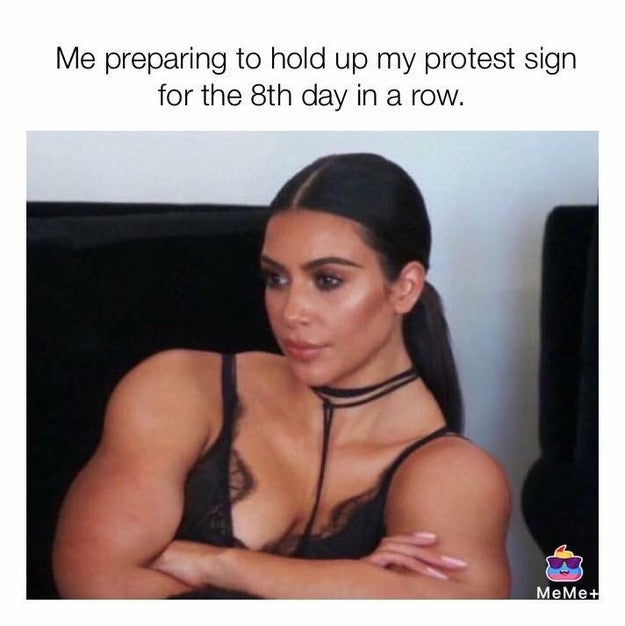
Via Emily Comer
“This strike wouldn’t have happened without the grassroots organization through the private Facebook group,” said Ryan Frankenberry, an organizer with the progressive West Virginia Working Families Party, which supported the teachers’ efforts. “The legislative leadership, unions, other organizations, were all helpful. But without question, I don’t think this would have reached the critical mass that was needed had they not had the platform of the group to communicate.”
Emily Comer is an American Federation of Teachers (AFT) union member and a West Virginia teacher. When she noticed waning AFT interest and attendance, she, along with fellow teacher Jay O’Neal, started the Facebook group to be a place where teachers, as well as school service personnel and other public employees, could communicate.
“People have not been super active in unions in the last several years,” she told BuzzFeed News. “We thought this would be an easier way to get in touch with people, and keep people updated on what was going on.”
Initially, the group was meant to share event info, like dates and times for public hearings held to discuss health benefits. Because the group wasn’t affiliated with either of the two West Virginia teachers’ unions, or any one political party — Facebook group membership includes both liberals and Trump voters — it reached a wider swath of workers, and “caused people to come out to the hearings in large numbers,” Comer said.
“Facebook contributed to a sense of everyone being in it together,” said Comer.
Teacher and group member Erica Newsome described the group as being “a pretty good mix.”
“West Virginia was a red state in the last election, but none of that has really come up,” she said. “We have a common enemy here, and it’s the people at our state capital who are looking out for corporations instead of us.”
As members grew bolder, these memes began making their way onto t-shirts, protest signs, and public Facebook feeds, sometimes going what Comer called “West Virginia viral.”
As membership swelled, Comer and O’Neal sought out additional colleagues to be moderators. They evaluated each new addition, making sure they were actually public employees, not bystanders and imposters trying to join “just to be divisive.”
At first, the group was mostly a place to vent and share information. But as membership grew, and public employees got more and more frustrated, it increasingly became a place where teachers outlined strategies and distributed plans.
“We would use Facebook to coordinate,’” said Newsome, who’s a union member and joined the group when it was only about a thousand people. "We had our union reps at the capitol every day, and they'd get on [Facebook] and say who's saying what, who's proposing what, what's being considered. That information has been really key, and Facebook has been a really good source of that."
Of course, the actual voting on whether or not to strike took place in person. But Newsome thinks the fellowship of the group may have swayed some members. "West Virginia can be an isolating place,” she said. “Communities can be far from each other. I'm here in southern West Virginia, which is more impoverished than the northern part of the state. But being on Facebook, I'm like, 'Hey, they're ticked off at the same stuff as we are. They're having the same issues, too.'"
Teachers also used the group to organize food collection for students, many of whom depend on school meals. (At one West Virginia school, 300 of 430 students rely on two school meals a day for nutrition, according to USA Today.)
The closed Facebook group also became the place where public employees found their collective voice in memes, hashtags, and rap lyrics. It’s where the now widespread hashtag #55strong — for the 55 counties of West Virginia, each of which voted to walk out — came from. And it’s where, protected from the trolls and attack ads of Facebook’s main News Feed, teachers shared their anger, often in the form of memes and slogans. At first, these were developed and shared only inside the group. But as members grew bolder, these memes began making their way onto t-shirts, protest signs, and public Facebook feeds, sometimes going what Comer called “West Virginia viral.”
The memes targeted both the villains and heroes in the teacher’s strike. Mitch Carmichael, West Virginia’s Republican senate president, was the main villain, because of his stalwart resistance to the idea of raising teacher pay via oil and gas taxes. “Any rap song that had the word ‘bitch’ in it, they changed it to have ‘Mitch’ in it,” said Comer of the group members.
In the nature of memes, a Facebook post that said “Move, Mitch, get out the way!” quickly became a photo of Carmichael with the words “I should have moved when they told me to get out the way” splashed over it.
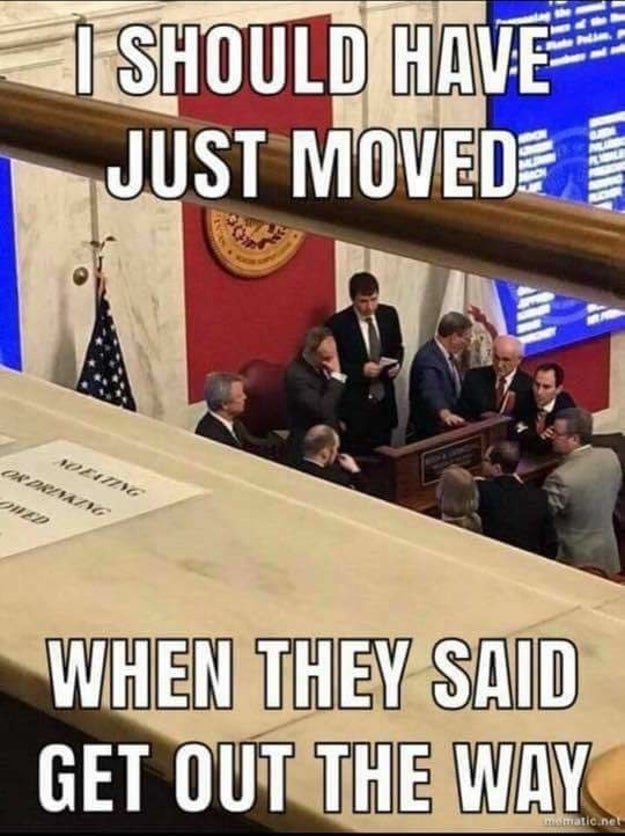
On the side of the heroes was Democratic West Virginia senator Richard Ojeda, a veteran of both Iraq and Afghanistan who taught in West Virginia himself for four years and sponsored the gas severance tax. The teachers’ memes compared Ojeda to Obi-Wan Kenobi, and turned him into a Chuck Norris-esque tough guy character.
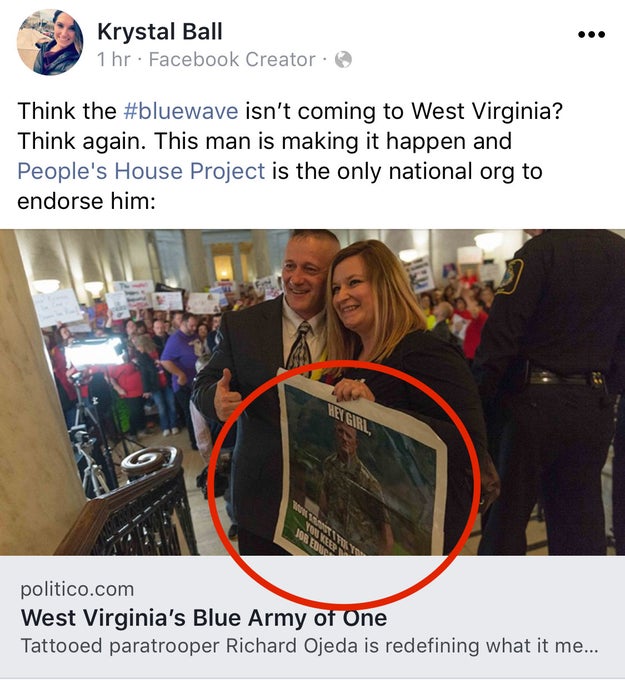
The meme of Senate President Carmichael as an evil villain and Senator Ojeda as the working man’s savior with guns blazing became so popular, the teachers eventually shared patterns of it in the group and put it on homemade t-shirts.
A homemade protest t-shirt designed in the Facebook group:
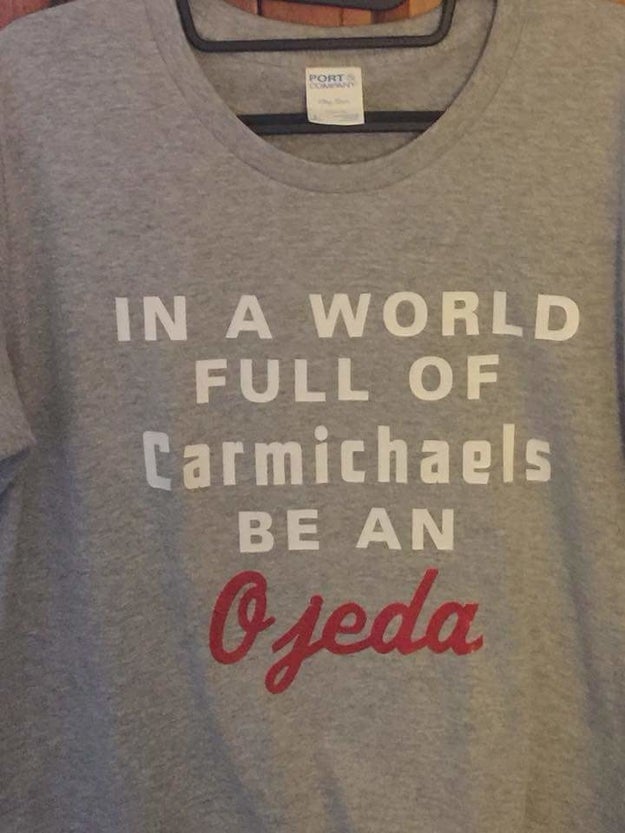
The group members became so quick at turning moments into memes, that Frankenberry said he started looking for videos and images from the legislature floor or interactions on social media that he could “help make … go viral by pushing it through the group.”
For example, late on Saturday night, three days before the strike ended, the West Virginia senate meant to pass a bill guaranteeing teachers a 4% raise, but due to a “clerical error,” accidentally passed an older version stipulating a 5% raise. The legislators went to great logistical effort to undo their mistake, which Frankenberry said was “a big middle finger to all the teachers.”
“[Democratic Senator John] Unger basically called them out for that,” he said. “I clipped it immediately, and put it on Facebook and pushed it through the group.”
A meme about the “clerical error” in the senate:
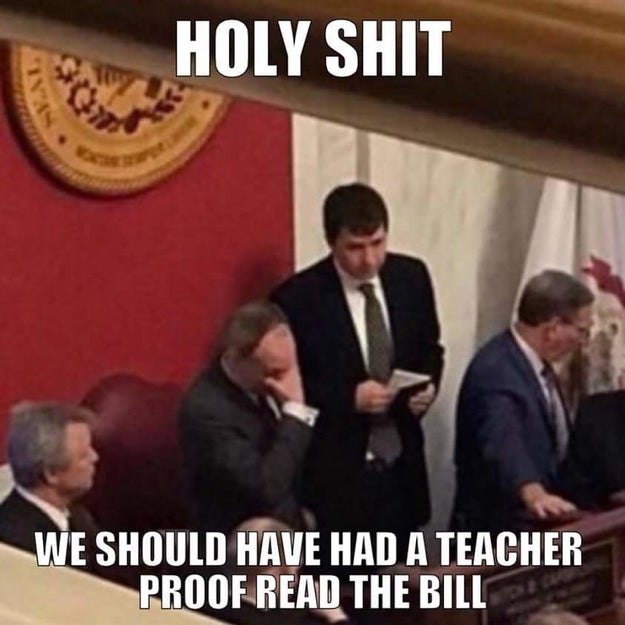
In addition to memes, live video was key to spreading information and drumming up support within the teachers’ movement. Many democrats used Facebook Live to stream from the capitol building or their offices, Frankenberry said, giving the protesters a sense of direct access. Senator Ojeda's last three live videos got 163,000, 216,000 and 129,000 views, respectively. Frankenberry said after the capitol’s live stream repeatedly crashed due to network overload, the government switched to using Facebook, too.
Up until the last few years, reliable Internet access has been limited in many parts of West Virginia, and social media has only recently penetrated certain communities. The sheer reach of these tools made teachers and other public employees not only more comfortable about coming out in favor of a strike online, but eventually with making public demonstrations in real life. “I'd say this wouldn't have been this successful four or even two years ago,” said Frankenberry.
In the last few days, the momentum in West Virginia has spread to Oklahoma, where over 40,000 Facebook users have joined an Oklahoma Teachers United Facebook group, and there are rumblings of walk outs and strikes. A similar Facebook group for teachers in Arizona started Thursday night already has over 20,000 members.
“West Virginia does have a long history of wildcat strikes,” said Newsome. “But in terms of all 55 counties going out, that has never happened, and it would not have happened if it wasn't for social media.”
Author: Caroline O'Donovan
Published at: Wed, 07 Mar 2018 19:47:43 -0500

No comments:
Post a Comment